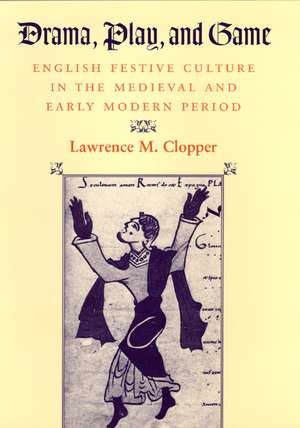Drama, Play, and Game: English Festive Culture in the Medieval and Early Modern Period
Autor Lawrence M. Clopperen Limba Engleză Hardback – iul 2001
How was it possible for drama, especially biblical representations, to appear in the Christian West given the church's condemnation of the theatrum of the ancient world?In a book with radical implications for the study of medieval literature, Lawrence Clopper resolves this perplexing question.
Drama, Play, and Game demonstrates that the theatrum repudiated by medieval clerics was not "theater" as we understand the term today. Clopper contends that critics have misrepresented Western stage history because they have assumed that theatrum designates a place where drama is performed. While theatrum was thought of as a site of spectacle during the Middle Ages, the term was more closely connected with immodest behavior and lurid forms of festive culture. Clerics were not opposed to liturgical representations in churches, but they strove ardently to suppress May games, ludi, festivals, and liturgical parodies. Medieval drama, then, stemmed from a more vernacular tradition than previously acknowledged-one developed by England's laity outside the boundaries of clerical rule.
Drama, Play, and Game demonstrates that the theatrum repudiated by medieval clerics was not "theater" as we understand the term today. Clopper contends that critics have misrepresented Western stage history because they have assumed that theatrum designates a place where drama is performed. While theatrum was thought of as a site of spectacle during the Middle Ages, the term was more closely connected with immodest behavior and lurid forms of festive culture. Clerics were not opposed to liturgical representations in churches, but they strove ardently to suppress May games, ludi, festivals, and liturgical parodies. Medieval drama, then, stemmed from a more vernacular tradition than previously acknowledged-one developed by England's laity outside the boundaries of clerical rule.
Preț: 381.84 lei
Preț vechi: 479.08 lei
-20% Nou
Puncte Express: 573
Preț estimativ în valută:
73.09€ • 76.73$ • 60.38£
73.09€ • 76.73$ • 60.38£
Carte indisponibilă temporar
Doresc să fiu notificat când acest titlu va fi disponibil:
Se trimite...
Preluare comenzi: 021 569.72.76
Specificații
ISBN-13: 9780226110301
ISBN-10: 0226110303
Pagini: 384
Dimensiuni: 152 x 229 x 28 mm
Greutate: 0.63 kg
Ediția:1
Editura: University of Chicago Press
Colecția University of Chicago Press
ISBN-10: 0226110303
Pagini: 384
Dimensiuni: 152 x 229 x 28 mm
Greutate: 0.63 kg
Ediția:1
Editura: University of Chicago Press
Colecția University of Chicago Press
Notă biografică
Lawrence M. Clopper is a professor of English at Indiana University. He is the author of Songes of Rechelesnesse: Langland and the Franciscans and The Dramatic Records of Chester, 1399-1642.
Cuprins
Acknowledgments
Introduction
1. The Theatrum and the Rhetoric of Abuse in the Middle Ages
2. Miracula, Ludi inhonesti, "Somergames," and the Tretise of Miraclis Pleyinge
3. Communitas: The Ludi of Monasteries and Cathedrals, Towns and Parishes
4. Civitas: Drama and the City
5. Texts and Performances
6. The Matter of These Plays
7. Variety in the Dramas of East Anglia
8. The Persistence of "Medieval Drama" in the Tudor and Elizabethan Periods
Appendix I. References to Miracula, Miracles, and Steracles in Medieval and Early Modern England
Appendix II. Communitas: The Play of Saints in Late Medieval and Tudor England
Works Cited
Index
Introduction
1. The Theatrum and the Rhetoric of Abuse in the Middle Ages
2. Miracula, Ludi inhonesti, "Somergames," and the Tretise of Miraclis Pleyinge
3. Communitas: The Ludi of Monasteries and Cathedrals, Towns and Parishes
4. Civitas: Drama and the City
5. Texts and Performances
6. The Matter of These Plays
7. Variety in the Dramas of East Anglia
8. The Persistence of "Medieval Drama" in the Tudor and Elizabethan Periods
Appendix I. References to Miracula, Miracles, and Steracles in Medieval and Early Modern England
Appendix II. Communitas: The Play of Saints in Late Medieval and Tudor England
Works Cited
Index
